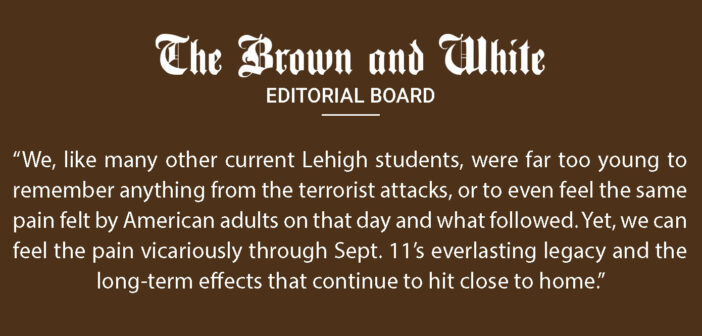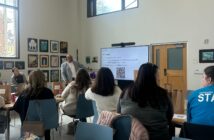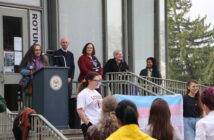Saturday marked twenty years since Sept. 11, 2001. Nearly all Americans recognize it as, arguably, the most horrific tragedy to befall the U.S.
Two thousand, nine hundred and seventy seven people died and thousands more were injured from a series of coordinated terrorist attacks on the World Trade Center in New York City and the Pentagon in Washington, D.C. These attacks were carried out by Islamist extremist group al-Qaeda.
On that fateful morning, the entire nation entered a state of collective panic. The national conscience would remain that way for days to come as uncertainty loomed.
Precisely 20 years later, the pain is still felt. Every year on Sept. 11, people commemorate the heroes and victims who lost their lives that day.
Social media pages are flooded with remembrance posts. News outlets halt typical coverage to run various stories in memoriam. Schools incorporate the attacks into lesson plans. The eminent phrase “never forget” is sprinkled in conversations.
We, like many other current Lehigh students, were far too young to remember anything from the terrorist attacks, or to even feel the same pain felt by American adults on that day and what followed.
Yet, we can feel the pain vicariously through Sept. 11’s everlasting legacy and the long-term effects that continue to hit close to home.
Eight Lehigh alumni and four parents of Lehigh students were killed that day. There are parents who struggle with complications caused by Sept. 11 smoke inhalation to this day.
Throughout our entire lives, we’ve also consistently been educated on Sept. 11 and its sheer importance.
We weren’t mentally “there” but those who were strove to pass its legacy to us. The importance of that day will be passed on for many generations to come.
With its effects still being felt two decades later, we cannot help but ask ourselves: Have we learned from Sept. 11? Have we changed because of it?
Merely one month after Sept. 11, the War in Afghanistan began in an effort to fight both the Taliban and al-Qaeda.
Less than three weeks ago, shortly after President Biden pulled U.S. troops out of Afghanistan, the Taliban overran the nation’s government forces and seized power throughout the majority of the country. While it was the longest war in American history, we remain at a point of high tension with Afghanistan.
In the aftermath of Sept. 11, the nation united in solidarity against the horror and tragedy of the attack. However, U.S. political polarization is currently at an all-time high. Now, “uniting as a country” is not as realistic.
Sorrow and remorse for those who died on Sept. 11 was indubitably at a high level across the country. Yet that same level of sorrow seems to be missing for other catastrophic events, most likely due to political polarity.
That level is nothing near what is felt for victims of catastrophes like school shootings or even COVID-19.
Many people were quick to unite when our country was attacked by a foreign terrorist group. But for other attacks and catastrophes in America, the overall recognition of the underlying issues and sorrowful feelings is blurred.
The Sept. 11 attacks have a lasting legacy, which still impacts us today. It’s essential to forever remember and commemorate the day, as well as continue to pass on its legacy and educate future generations on its impact.
But by continuing to acknowledge the importance of its legacy, lessons need to be learned and lasting changes need to be made.






Comment policy
Comments posted to The Brown and White website are reviewed by a moderator before being approved. Incendiary speech or harassing language, including comments targeted at individuals, may be deemed unacceptable and not published. Spam and other soliciting will also be declined.
The Brown and White also reserves the right to not publish entirely anonymous comments.